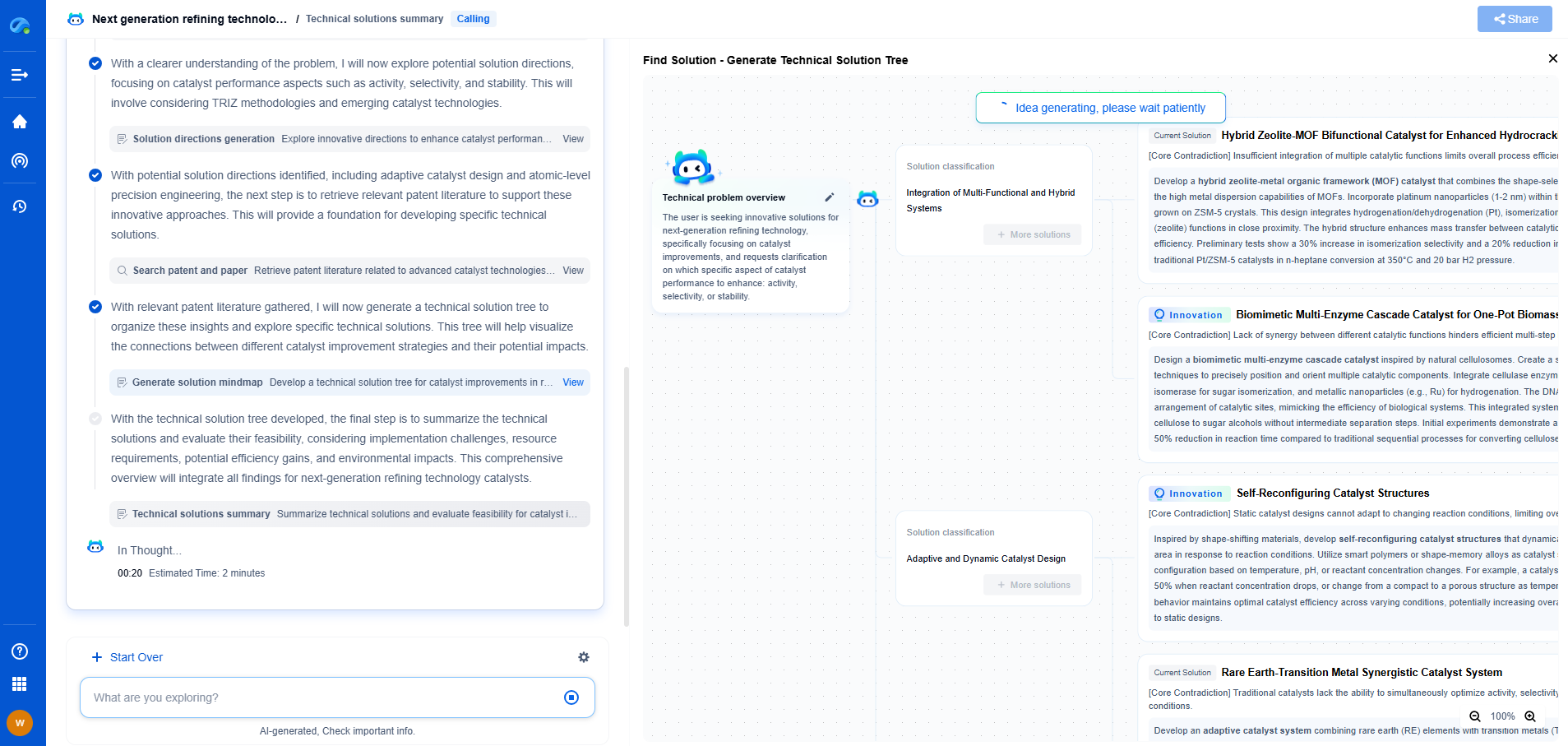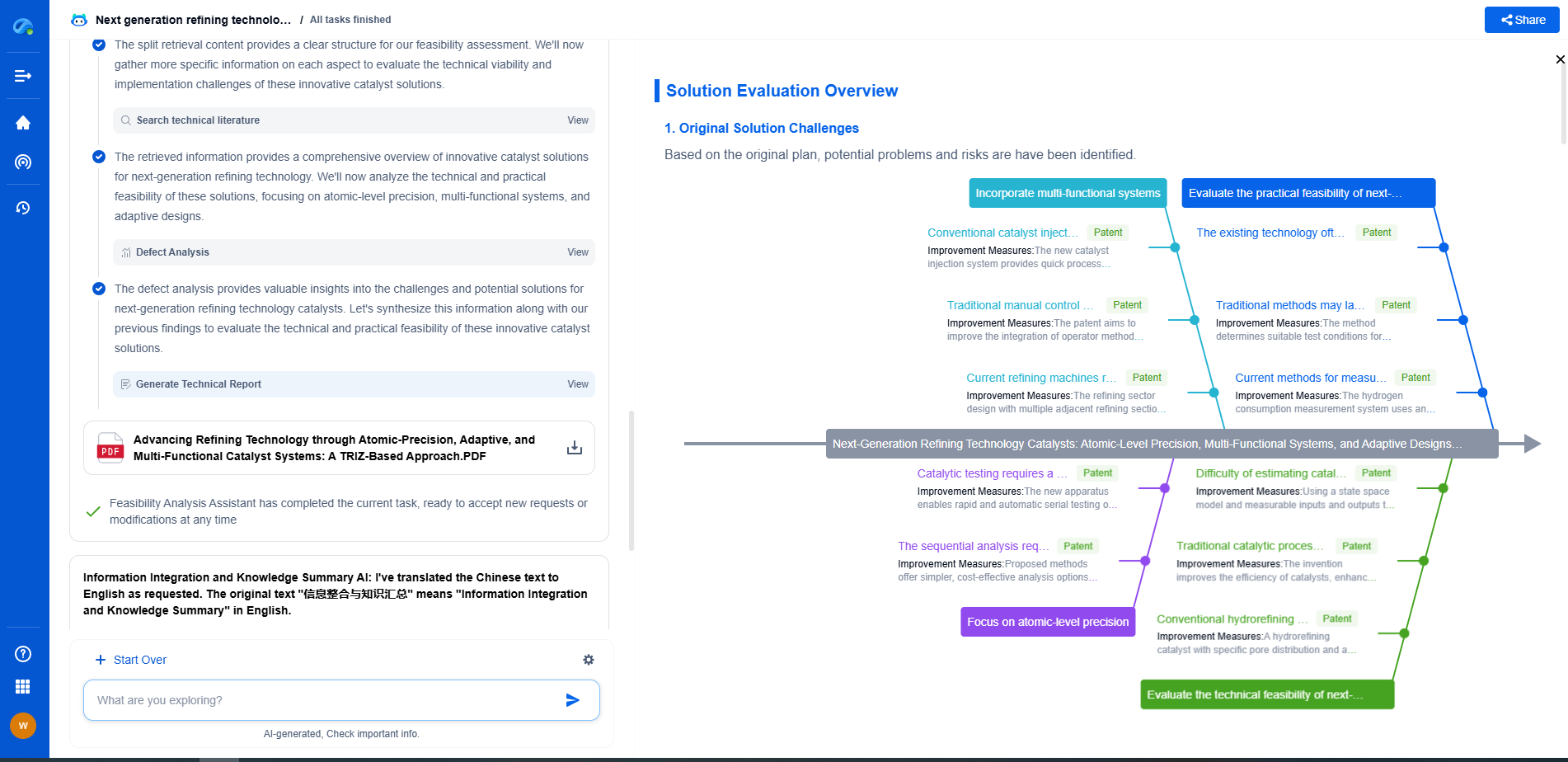What is Tensile Strength in Plastics? Testing and Meaning
JUL 3, 2025 |
Tensile strength is a critical property of materials, particularly in industries where plastic components are subjected to stress, stretching, or tension. It is a measure of how much force a material can withstand before breaking. In this article, we delve into the concept of tensile strength in plastics, its significance, and how it is tested.
The Importance of Tensile Strength in Plastics
Tensile strength is a fundamental parameter when it comes to selecting suitable plastic materials for various applications. It determines the durability and reliability of a plastic product when subjected to elongation forces. High tensile strength in plastics is often desirable in applications such as automotive parts, construction materials, and consumer electronics, where mechanical integrity is crucial.
Factors Affecting Tensile Strength
Several factors influence the tensile strength of plastics, including the type of polymer, additives used, and the manufacturing process. The molecular structure of the polymer chains plays a significant role; for example, thermosetting plastics generally exhibit higher tensile strength compared to thermoplastics due to their cross-linked molecular structure. Additives like fillers and reinforcements can also enhance the tensile strength by improving the material’s rigidity and resistance to deformation.
Testing Methods for Tensile Strength
Tensile testing is the primary method used to determine the tensile strength of plastic materials. This test typically involves a standardized sample of the plastic being pulled apart by a machine until it breaks. The testing apparatus measures the force applied and the elongation of the material, providing valuable data on its tensile properties.
One common testing standard is the ASTM D638, which outlines the procedure for tensile testing of plastics. The test results are used to plot a stress-strain curve, from which the tensile strength can be determined. This curve not only shows the maximum stress the material can withstand but also provides insights into its elasticity, ductility, and toughness.
Interpreting Tensile Strength Data
Interpreting the data obtained from tensile testing is crucial for material selection and product design. The tensile strength value is typically expressed in megapascals (MPa) or pounds per square inch (psi). A higher tensile strength indicates a more robust material capable of withstanding greater forces without failure. However, it is vital to consider other material properties, such as impact resistance and flexibility, to ensure the plastic meets all performance requirements for its intended application.
Applications and Implications
Understanding tensile strength is vital across various industries. Engineers and designers rely on tensile strength data to make informed decisions about material choices, ensuring safety, efficiency, and cost-effectiveness. For instance, in the automotive industry, plastics with high tensile strength are chosen for components that require durability under mechanical stress, such as bumper systems and dashboard panels.
Conclusion
Tensile strength is a key property that defines the ability of plastic materials to endure tension without breaking. By understanding and testing this property, manufacturers can ensure their products meet the necessary standards and perform effectively in their intended applications. As technology and material science continue to advance, the development of plastics with improved tensile properties will open new avenues for innovation and application in various fields.
Transform Polymeric Innovation with Patsnap Eureka
From biodegradable polymers to high-performance composites, the world of polymeric compounds is evolving faster than ever—driven by the demands of sustainability, functional customization, and global IP competition. Whether you're exploring novel copolymer architectures, optimizing polymerization techniques, or tracking material patents in bioplastics, time-to-insight is everything.
Patsnap Eureka, our intelligent AI assistant built for R&D professionals in high-tech sectors, empowers you with real-time expert-level analysis, technology roadmap exploration, and strategic mapping of core patents—all within a seamless, user-friendly interface.
Whether you're working on next-gen packaging films, bio-based resins, smart polymers for electronics, or new thermal-resistant composites, Eureka accelerates your journey from idea to patent to product—with unmatched clarity and speed.
🔍 Experience how Eureka can power your polymer R&D with AI intelligence—start your free trial today and unlock the future of materials innovation.
- R&D
- Intellectual Property
- Life Sciences
- Materials
- Tech Scout
- Unparalleled Data Quality
- Higher Quality Content
- 60% Fewer Hallucinations
Browse by: Latest US Patents, China's latest patents, Technical Efficacy Thesaurus, Application Domain, Technology Topic, Popular Technical Reports.
© 2025 PatSnap. All rights reserved.Legal|Privacy policy|Modern Slavery Act Transparency Statement|Sitemap|About US| Contact US: help@patsnap.com

